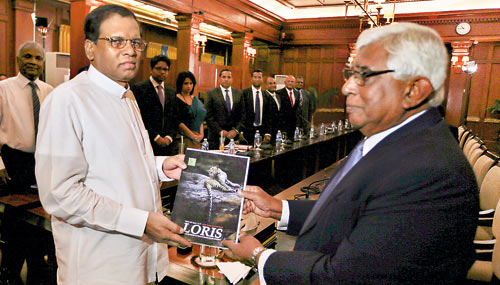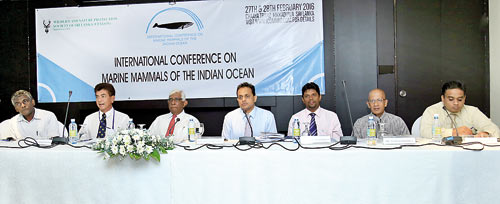News
Providing land to displaced a monumental problem: President tells nature protection society
It is the responsibility of the Government to provide land to people displaced by the conflict, assured President Maithripala Sirisena, but not to third and fourth generations of those families.

WNPS President Prof. Lakdas Fernando presents the first issue of the 120th anniversary publication of the ‘Loris’ to President Maithripala Sirisena, as the WNPS Executive Committee looks on. (Pic from Presidential Secretariat)
“This is a ‘barapathala prashnayak’,” the President told the Wildlife and Nature Protection Society (WNPS) of Sri Lanka on Monday morning at the Presidential Secretariat, pointing out that it is a huge problem.
Stressing that the Government is also duty-bound to protect the forest cover in the country and safeguard it from racketeers and also politicians, he said that encroachments which occurred during the earlier era have lessened now. The forests in the north were saved from destruction because of the war, as people did not have access to those areas.
While pointing out that the Department of Wildlife Conservation (DWC) has been instructed to set in motion a new work-plan, the President suggested that the WNPS should have meetings on a regular basis with him.
Submit written suggestions to me with regard to any environmental issue or problem, he said, adding that he would meet them in two to three months to discuss these matters.
Monday morning’s meeting may have been brief but it was momentous, for the high-level delegation from the WNPS presented President Sirisena who is the Patron of their society, the latest issue of ‘Loris’ on the 120th anniversary of this pioneering conservation group.
The ‘Loris’ has been in publication since 1936 and is thought to be one of the oldest conservation journals in the country and South Asia. The WNPS had been established on May 23, 1894.

Among those present at the media briefing were (from left) Professor in Zoology, University of Colombo, Prof. Devaka Weerakoon; Director Research, Centre for Research on Indian Ocean Marine Mammals, Howard Martenstyn; WNPS President Prof. Lakdas Fernando Chairman, Sri Lanka Tourism Promotion Bureau, Dr. Rohantha Athukorala; Assistant Director (Research & Development Unit), Central Environmental Authority, Dr. Ajith Gunawardena; Coordinator of Marine & Coastal Thematic Area of the International Union for Conservation of Nature, Arjan Rajasuriya; and Director, CDC Events, Imran Hassen.Pic by Anuradha Bandara
The latest issue of ‘Loris’ was sponsored by Textured Jersey Lanka PLC, which has also pledged continued financial commitment to the reforestation and school projects of the WNPS.
Earlier, WNPS President Prof. Lakdas Fernando said that the Government has inherited a plethora of environmental problems such as in Wilpattu, Madhu Reserve, Udawattakele, Kalpitiya and the Bar Reef, Uma Oya, Yan Oya and the human-elephant conflict, to name but a few. “We hope that your administration will change the previous policies of exploitation of these precious places to that of protecting them for posterity,” he said, pointing out that the WNPS has launched projects to try and assist in this process.
These projects include the reforestation of denuded rainforest and a proposal for the enrichment of Udawattakele. The WNPS is also scheduled to host two international symposia on wild cats and Indian Ocean marine mammals.
“As Patron of the society, we look forward to your guidance and assistance in these projects, while offering our services whenever required, in formulating plans and policies for the better protection of Sri Lanka’s forests and wildlife,” said Prof. Fernando.
According to Prof. Fernando the WNPS is the second oldest non-governmental organisation of its kind in South Asia. It was instrumental in setting up the first National Parks in Sri Lanka as well as the establishment of the DWC as the statutory body for the protection and governance of protected areas.
“While development is essential, such development must be planned and take into account the consequences on the environment and natural habitat,” he said.
Referring to President Sirisena’s demonstration of his commitment to the protection of the environment by taking it under his wing, Prof. Fernando said that the WNPS has no doubt that he would ensure that due processes are adhered to in ensuring that proper Environmental Impact Assessments and environmental costing are undertaken before proceeding with future development projects.
“This has been the core problem in many of the environmental disasters that are causing a public outcry today. If conserved properly, the National Parks and Sanctuaries and the fauna and flora protected within, can contribute large amounts in foreign exchange to the country, for generations to come. This is in addition to ensuring that the generations to come may enjoy a healthy environment, with clean air and water, for which the preservation of the forests of Sri Lanka in their pristine condition is essential,” he added.
| WNPS now focuses on aquatic habitats Concerned mostly with terrestrial habitats and their animals and plants in the past, the WNPS is now venturing into water, focusing on aquatic habitats and biodiversity. The WNPS announced the holding of a two-day ‘International Conference on Marine Mammals of the Indian Ocean’ on February 27 and 28, next year, at a media briefing on Thursday at the Cinnamon Grand Hotel in Colombo. “Of a possible 38 marine mammal species found in the Indian Ocean, 28 species have been reported in the waters around Sri Lanka,” said WNPS President Prof. Lakdas Fernando, adding that aquatic habitats and biodiversity is an area “largely neglected” and “under-studied” from the conservation point of view even at a national level. The charismatic and awe-inspiring animals that live in the sea have been the focus of study by many interested people in recent years, including Sri Lankans. “But there is still a lot we do not know,” he said. This is why the WNPS is hoping that the conference will attract researchers of repute to contribute their knowledge for the better management of whales, dolphins and dugongs. “The aim of the conference is to encourage scientists to actively engage in research to promote conservation. Conservation will be best served by an understanding of the biology of these animals to better manage the animal-human interaction in an attempt to reduce conflict that results in the animals being the losers. To achieve this, there has to be understanding and active involvement of the governmental authorities, the public and the politicians and we hope we will be able to involve all these players,” Prof. Fernando added. Next year’s marine mammal conference is scheduled to be held at Hotel Chaaya Tranz in Hikkaduwa. |

